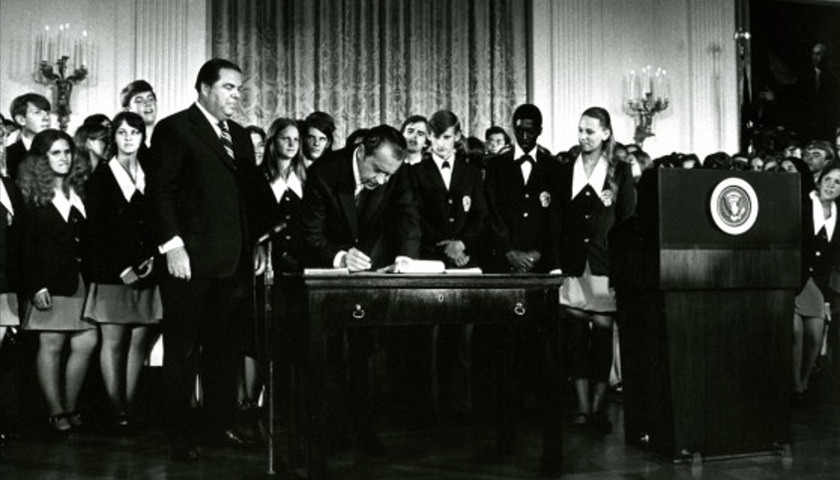Monday morning on the Tennessee Star Report, host Michael Patrick Leahy welcomed all-star panelist Crom Carmichael to the studio to examine the case of Nancy Pelosi looking to unseat (R) Mariannette Miller-Meeks from her House seat.
Read the full storyTag: U.S. House of Representatives
Alabama Representative Mo Brooks Calls Attacks on His Rally Speech a ‘Scurrilous, George Orwellian’ Strategy
U.S. Representative Mo Brooks (AL-05) on Tuesday responded to the “scurrilous, George Orwellian” attacks that Democrats are making against him over his “Save America” rally speech on January 6.
An official censure was proposed by U.S. Representatives Debbie Wasserman Schultz (D-FL-23) and Tom Malinowski (D-NJ-07), the Washington Examiner said.
Read the full storyState Delegate Nick Freitas Is Ready to Win Virginia’s Seventh Congressional District
At a small rally on the lawn of a local courthouse, Del. Nicholas Freitas (R-Culpeper County) exuded confidence in his ability to win Virginia’s seventh congressional district and reclaim the seat for Republicans.
Freitas is squaring up against incumbent Abigail Spanberger (D-VA-07), who recently became a member of the U.S. House of Representatives in 2019.
Read the full storyRep. Bruce Griffey Questions Lee Administration About Not Sharing Data with the U.S. Census Bureau That Would Help Estimate Illegals in Tennessee
State Representative Bruce Griffey (R-Paris) sent a letter to Governor Bill Lee on Friday questioning why Tennessee was not sharing data with the U.S. Census Bureau that would help estimate the number of illegal aliens living in Tennessee.
The issue arises out of President Trump’s memorandum this week to the Secretary of Commerce that excludes illegal aliens from the apportionment of the U.S. House of Representatives that follows the decennial census.
Read the full storyHouse Ethics Committee Extends Investigation into Rep. Tlaib Over Misused Campaign Funds
The Ethics Committee from the U.S. House of Representatives released a report on Thursday recommending an extension of the investigation into Rep. Rashida Tlaib (D-MI-13), saying there is “substantial reason to believe” the representative misused campaign funds.
Read the full storyGregory Watson Commentary: U.S. House of Representatives’ Quiet Procedural Snub of President Trump’s 2019 SOTU Address
When any American President formally speaks before a joint session of the two houses of the U.S. Congress, it is considered a matter of great importance to our nation — and certainly ought to be viewed as quite significant by members of Congress. The State-of-the-Union (SOTU) address — regardless of which President is delivering it, and irrespective of his or her party affiliation — is never trivial. When a President gives his or her remarks, both houses of Congress are officially in session at that point and — just as at any other such time — the words spoken to those persons present within the House chamber are to be reduced to writing and spread upon the Congressional Record. This, of course, is to preserve for posterity such historic comments and to make them more widely available to anyone desiring to reflect back upon them. Hence, it is with some surprise that the full and complete verbatim text of President Donald Trump’s February 5, 2019 speech — and, as it turns out, likewise his February 28, 2017 as well as his January 30, 2018 SOTU addresses – are all completely missing from the Congressional Record. So, I did some investigating.…
Read the full storyCommentary: What The U.S. Constitution Really Says On The Subject Of Impeachment And Trial Removal Of The President
Before then-President-elect Donald Trump could even take the official oath of office on January 20, 2017, his critics were already chattering about the possibility of Trump’s tenure in the White House being truncated by means of involuntary removal. Throughout 2017 and 2018, there has been, and continues to be, spirited discussion by the President’s detractors of the possibility of expelling him from office by means of the impeachment-and-trial process that is found in separate parts of the U.S. Constitution. One of the most ardent advocates of ousting President Trump has been U.S. Representative Maxine Waters (D-California). Another has been her colleague, U.S. Representative Al Green (D-Texas) who actually went so far as to offer articles of impeachment against the President only to be soundly rebuffed, as recently as January 19, 2018, by a procedural motion-to-table Green’s House Resolution No. 705 with 355 yeas, 66 nays, 3 “present”, and 6 “not voting”. Prior to the recent November 6, 2018, general election, some members of the U.S. House of Representatives vowed that, if the partisan composition of that body would flip from majority Republican to majority Democrat — which it certainly did on November 6th — efforts to impeach the President would…
Read the full storyTennessee State Lawmakers Gave Up a Section of the State Constitution When They Quickly Ratified The U.S. Constitution’s 26th Amendment
Back in 1971, the Tennessee General Assembly quickly ratified the 26th Amendment to the Constitution of the United States, which lowered the voting age in all elections–federal, state and local– to 18 in every state. By doing so, they voluntarily give up a section of the Tennessee State Constitution. Here’s that story: During the late 1960s and early 1970s, the Vietnam War — with which the United States was heavily involved — continued to rage overseas. With so many American soldiers — several of them younger than 20 years of age — dying on the battlefields of a foreign land in this War, public opinion within the United States began to shift in terms of by what age a person should become eligible to vote. At the time, an individual had to be at least 21 years of age in order to register to vote. But with the evolution in social sentiment occasioned at least in part by the Vietnam War, Congress began to take steps to lower that age from 21 down to 18. A popular slogan of the day was “if you are old enough to fight for your country, then you are old enough to cast a…
Read the full story







